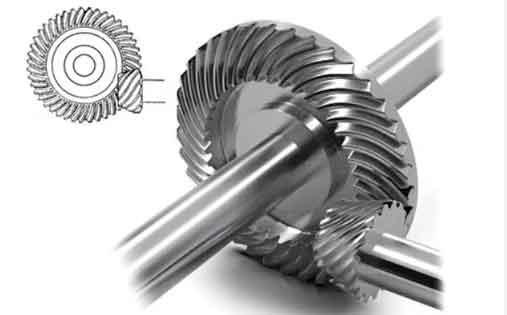Spiral bevel gears have a significant impact on the durability and overall performance of heavy machinery used in industries such as construction, mining, agriculture, and manufacturing. The unique advantages of spiral bevel gears, including their ability to transmit power at angles and their high efficiency, make them an essential component in the design of heavy-duty machinery. The impact of spiral bevel gears on the durability of such machinery can be analyzed through several key aspects:

Improved Load Distribution
The spiral tooth design of bevel gears provides a larger contact area compared to straight bevel gears. This increased contact area allows for a more even distribution of stress across the gear teeth, reducing peak stress points and the risk of tooth failure under heavy loads. Consequently, spiral bevel gears can handle higher torque levels and are less likely to suffer from premature wear or breakage, thereby enhancing the machinery’s durability.
High Power Transmission Efficiency
Spiral bevel gears are highly efficient in transmitting power, with efficiencies typically ranging from 95% to 99%. This high efficiency means that less power is lost as heat, reducing thermal stresses on spiral bevel gears and associated components. For heavy machinery, which often operates under high load for extended periods, this efficiency is crucial in minimizing wear and extending the lifespan of spiral bevel gears system and the machinery as a whole.
Reduced Noise and Vibration
The smoother engagement of spiral bevel gears, due to the gradual contact of their curved teeth, significantly reduces noise and vibration levels during operation. In heavy machinery, excessive vibration can lead to faster wear of components, loosening of fasteners, and potential structural damage over time. By mitigating these forces, spiral bevel gears contribute to the machinery’s structural integrity and longevity.
Enhanced Operational Reliability
The reliability of heavy machinery is critical, especially in industries where equipment downtime can result in significant financial losses. Spiral bevel gears’ ability to operate smoothly under high loads and at high speeds contributes to the overall reliability of the machinery. Their durability reduces the likelihood of gear failure, which is essential for maintaining continuous operation in demanding work environments.
Considerations for Material and Manufacturing
The materials used for spiral bevel gears in heavy machinery—typically high-strength alloys—along with advanced manufacturing processes, play a significant role in their durability. Heat treatment processes such as case hardening increase the surface hardness of spiral bevel gears, making them more resistant to wear and fatigue. Precision manufacturing is also crucial to ensure that the gears fit and operate correctly, minimizing the risk of premature wear or failure.
Maintenance and Lifespan
While spiral bevel gears are designed for durability, their lifespan in heavy machinery also depends on proper maintenance. Regular inspection and lubrication are essential to prevent wear and to ensure spiral bevel gears operate within their temperature and load-bearing limits. Adequate maintenance not only extends the life of spiral bevel gears but also contributes to the overall durability and operational efficiency of the machinery.
Conclusion
The impact of spiral bevel gears on the durability of heavy machinery is profound. Their design and operational characteristics directly contribute to the machinery’s ability to handle heavy loads, operate efficiently, and maintain reliability over time. By improving load distribution, reducing wear, and enhancing the machinery’s operational stability, spiral bevel gears play a crucial role in extending the lifespan and performance of heavy-duty equipment across various industries. As materials and manufacturing technologies continue to advance, the potential for even greater durability and efficiency in spiral bevel gears applications looks promising.
